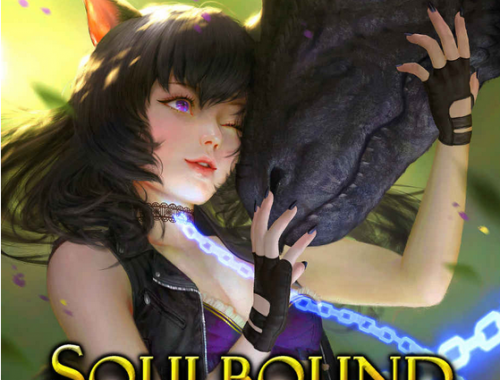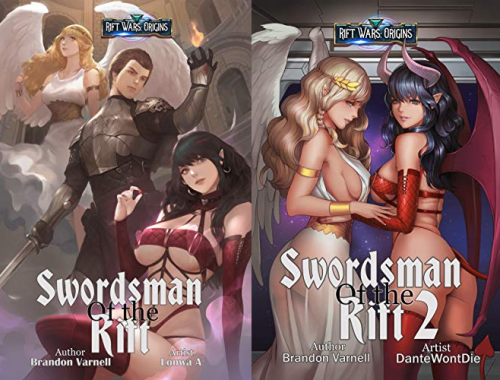Review: Six Sacred Swords
I don’t feel it’s fair to consider Andrew Rowe an Indie Author; after all, he has a remarkable number of credits to his name between work with Blizzard Entertainment and the highly acclaimed Shades of Venaya LARP. And yet, until a few months ago, I had never personally read any of his work or listened to any of the audiobooks reading from them. This all changed when it was recommended I read Six Sacred Swords, a novel set in Mr. Rowe’s world of Venaya. This particular novel is actually a bit of a side story that takes place between two as-yet unfinished trilogies the author continues to work on. It advertises itself as “light hearted fantasy adventure” and there’s a lot of truth to that. This is a story I enjoyed quite a bit, but also one I can only recommend with a couple of asterisks.
Note: the link above is an affiliate link. Purchases from such a link may result in a commission to myself.
It would be incorrect to say that Six Sacred Swords tells the story of one Keras Selyrian, a reoccurring character in some of Andrew Rowe’s other works, because as the book is written it is actually Keras that is telling the story. This framing narrative can be confusing at times. Essentially, in a fantasy world, Keras is with some of his students or disciples, telling the story of how he found himself in a foreign continent in search of the legendary sword Dawnbringer. The story seems to forget this framing narrative from time to time, only to come back to it suddenly and without warning. It was not a framing narrative I was fond of. A few times, when the main character referred to one of the travelers with him in the train, it threw off the flow of the story for me as I had to question who Keras was talking to before remembering that the story he was narrating wasn’t for me, the reader.
Keras is an interesting individual. He comes off as a bit overpowered at first glance. He’s an exceptionally skilled swordsman with a destructive blade that, if left unchecked, destroys everything around it with its deadly aura. Keras also is skilled with magic allowing him to manipulate steel, stone, and flames. Stranger, the way he handles magic does not involve an attunement, which is unusual for characters in this world and makes it harder for others fighting him to predict what his powers might be. Keras is also a bit of a pacifist in this book, for reasons that towards the end are explained. He doesn’t want to needlessly hurt or kill people, and this comes at the cost of him holding back a lot. It could be argued that Keras is more afraid of his potential power than anyone else he comes across. For me, personally, the reasoning made sense, but it also meant that Keras spent a lot of time dragging on fights because he refused to engage them readily. This is a character trait that won’t be for everyone and I could even see it ruining the book for some people.
That being said, Keras’s narration style is very entertaining. He’s snarky. He is insightful. He doesn’t always know what’s going on around him, sometimes strangely so. As an example, several times he is surprised by how healing potions work. He doesn’t know the lore of the country he’s in. He loves a fight when he feels it’s unlikely anyone will be killed. The way he tells his story shows us all of this.
The first fifth of the book sets up Keras’s meeting with two characters. The first is a mist dragon by the name of Reika. She’s not too familiar with the human world, getting all of her information from romance books. The second is Dawn, the voice inside the intelligent weapon Dawnbringer. There is a surprising amount of witty back-and-forth banter between these three. Reika doesn’t catch a lot of nuance of the world around her and takes things at face value; Dawn is a bit of a brat who loves teasing the main character because frankly as a sword she doesn’t have much better way to connect with whichever swordsman will wield her.
The three find themselves going on adventure together, as I suppose is traditional in these type of stories, in hopes of gaining an audience with one of the Goddesses. In a strange twist of fate it turns out that to prove his worthiness to wield Dawnbringer Keras was expected to have three sacred amulets. The trio make the decision to go after one of these. It does not go as planned.
One very notable and enjoyable facet of this story is how the main characters address and subverts various tropes found in fantasy literature and video games. Several puzzles in dungeons are not solved by wit so much as by brute force. Locked doors are more likely to get hacked down than to be actually unlocked. This makes sense in the context of the story and fits the feel of a lighthearted and fun adventure quite well, especially as unintended consequences rise from these decisions.
This book does end on a cliffhanger, hinting at some of the questions a sequel may answer. This is actually an issue for the series as a whole, because I am unable to read the following trilogy now without waiting for the sequel to this book. Rather frustrating for a book that was advertised as a stand alone adventure. I am told that the author struggles to actually finish his story arcs as well, which may be hearsay but it also concerning.
In short, this book was an entertaining read and a solid listen! I will be keeping my ears out for the next one. I am interested in seeing how this main character grows, how his dragon companion handles her expectations of the world she travels versus the worlds in her romance novels, and how the sword Dawnbringer comes to terms with being an intelligent weapon. I simply can’t recommend others make the plunge until more of the story is released, and I must caution that the solid writing, bantar, and not-so-subtle classic role playing game references come at the cost of a rather clunky framing device and a main character that perhaps holds back a little too much.


